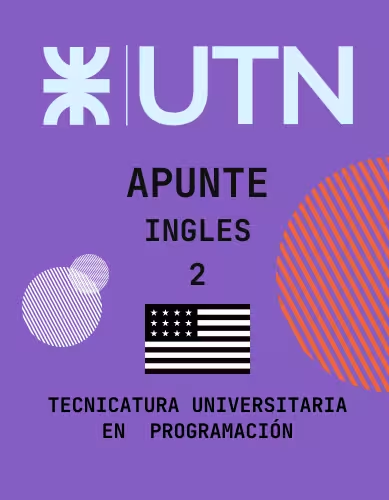Ingles 2
English II - Syllabus Overview
Inglés II profundiza en estructuras gramaticales, comprensión lectora y vocabulario técnico orientado a la informática y la programación. El objetivo es que el estudiante pueda leer, comprender y producir textos técnicos y académicos en inglés.
Main Topics
- Past Tenses (Simple Past, Past Continuous, Present Perfect)
- Future Tenses (Will, Going to, Future Continuous)
- Conditionals (Zero, First, Second, Third)
- Modal Verbs (Can, Could, Must, Should, Have to)
- Passive Voice
- Reported Speech
- Technical Vocabulary (Programming, Databases, Software Development)
- Reading Comprehension (Technical texts, documentation, emails)
- Writing Skills (Emails, reports, summaries)
Past Tenses
Simple Past
Used to describe actions that happened at a specific time in the past.
Example:
- I finished the project yesterday.
Past Continuous
Describes actions that were in progress at a specific time in the past.
Example:
- She was debugging the code when the error appeared.
Present Perfect
Describes actions that happened at an unspecified time or that started in the past and continue to the present.
Example:
- They have completed the database migration.
Future Tenses
Will vs Going to
- Will: Decisions made at the moment, predictions.
- Going to: Plans or intentions decided before the moment of speaking.
Examples:
- I will send you the report.
- I am going to study for the exam.
Future Continuous
Describes actions that will be in progress at a specific time in the future.
Example:
- This time next week, I will be presenting my project.
Conditionals
Zero Conditional
- If + present simple, present simple
- Used for general truths
Example:
- If you press this button, the program closes.
First Conditional
- If + present simple, will + infinitive
- Real possibility in the future
Example:
- If you study, you will pass the test.
Second Conditional
- If + past simple, would + infinitive
- Unreal or hypothetical situations
Example:
- If I had more time, I would learn another programming language.
Third Conditional
- If + past perfect, would have + past participle
- Imaginary situations in the past
Example:
- If you had saved your work, you wouldn’t have lost the file.
Modal Verbs
- Can / Could: Ability, possibility, permission
- Must / Have to: Obligation
- Should / Ought to: Advice
Examples:
- You must submit your assignment by Friday.
- Can I use your computer?
- You should check the documentation.
Passive Voice
Used when the focus is on the action, not who does it.
Example:
- The software was developed by the team.
- The bug has been fixed.
Reported Speech
Used to report what someone else said.
Example:
- She said that she was learning Python.
- The teacher explained that the exam would be next week.
Technical Vocabulary
- Algorithm: A set of instructions for solving a problem.
- Database: An organized collection of data.
- Debug: To find and fix errors in code.
- Framework: A platform for developing software applications.
- Query: A request for information from a database.
Reading Comprehension
Example Text
“The main advantage of using a relational database is the ability to organize data into tables. Each table consists of rows and columns, and relationships can be established between tables. This structure makes it easier to retrieve and analyze information.”
Questions:
- What is the main advantage of a relational database?
- How is data organized in a relational database?
- Why are relationships between tables important?
Writing Skills
Email Example
Subject: Request for Information
Dear Professor,
I would like to know the requirements for the final project. Could you please send me the guidelines?
Thank you in advance.
Best regards, Felipe
Practice Exercises
- Write five sentences using the present perfect tense related to your studies.
- Transform the following sentences into passive voice:
- The students completed the assignment.
- The company released a new software version.
- Write a short email to your professor asking for an extension on a deadline.
- Read a technical article and summarize the main points in English.
